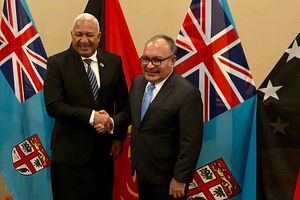China’s growing presence in the Pacific Islands has attracted increasing attention in the last year. Reports from Fairfax Media in Australia in April 2018 that the new Chinese-built wharf in Luganville, Vanuatu was destined to be used as a Chinese military base sparked heated debate about the changing geopolitics of the region and Australia’s perceived loss of influence. In this debate, there was scant appreciation of the agency of Pacific Island countries themselves. Too often in international media coverage of the region, Pacific Island states are either viewed as client states of major powers or as a bloc of countries lacking individual identities.
It is not unusual for countries outside the region to treat the island countries of the Pacific as one entity for diplomatic purposes. China has invited Pacific Island leaders to meet President Xi Jinping at the upcoming November APEC Summit hosted by Papua New Guinea. This follows a meeting Xi convened in Fiji in 2014 with Pacific Island leaders, during his brief transit after attending the G20 Summit in Brisbane. Taking the time to travel to each island nation, which is no easy task with poor air transport links across the region, is not feasible for most leaders or even foreign ministers beyond Australia and New Zealand. In addition, small Pacific Island nations, with limited financial and human resources for diplomacy, benefit from working collectively and joining group meetings with external partners. The Pacific Islands Forum facilitates this with its standing invitation for representatives from Post-Forum Dialogue partner countries to meet with Pacific Island leaders and the Forum Secretariat after their annual summit.
These meetings can obscure the complexity of the individual interests of each nation as well as the differences between them. Relations between Pacific Island states are often poorly understood internationally and even within the region, in part because they are not covered much beyond national Pacific media outlets and because government-to-government interactions are usually confined to regional and subregional meetings where the focus tends to be on regional rather than bilateral issues.

































